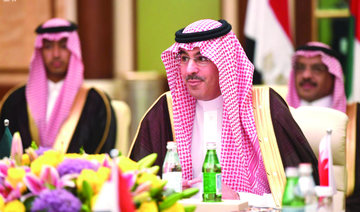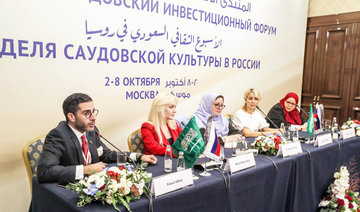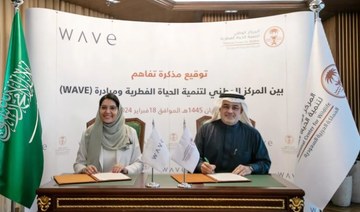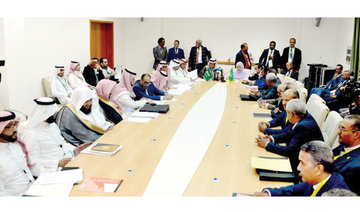MOSCOW: King Salman’s historic and unprecedented visit to Russia, which concluded on Saturday, has paved the way for new solutions to regional issues, analysts told Arab News.
“It is good that Russia and Saudi Arabia have finally met,” said Igor Delanoe, deputy director of the Moscow think tank Observo. “It is also good that the Saudis understand that Russia is not part of the problem in the Middle East, but rather part of the solution.”
If military cooperation continued as both countries wished, the results would be positive, he said. “This visit has proved that Russia is not an ally of Iran and that it does not support the Iranian regime, but keeps a balanced policy in the Middle East.”
On the Syrian conflict, he said, Russian successes such as the Astana de-escalation process made Russia an important and needed partner for Saudi Arabia.
Nickolay Soukhov, senior researcher at the Institute of Oriental Studies in the Russian Academy of Sciences, said much depended on how agreements signed between the two countries were turned into real steps and actions.
“This visit of King Salman gives a signal that Saudi Arabia has its own independent foreign policy to decide for itself who to cooperate with,” he said.
“The two countries still have some contradictory perceptions of many issues. Some have a long history, others are new ones. However, this visit has already paved the way to find compromises and to bring both countries closer in terms of perceptions of regional issues.”
Vasiliy Kuznetsov, head of the Department for Arab and Islamic Studies at the academy, said such visits were important in themselves, regardless of the outcome.
“Throughout my experience I don’t remember a visit of a foreign leader that was so eagerly awaited as the visit of King Salman,” he said.
“This visit is not only a sign of continuous rapprochement between Russia and Saudi Arabia, but also a strong signal to the Muslim community of the Middle East that Russia is a close friendly to them.”
It was important to point out that leaders of the Muslim republics had taken part in the summit between King Salman and the Russian President Vladimir Putin.
“Russia is building up strategic relations with Iran, and Turkey is far from constructing alliances,” he said. “It is impossible to build a regional system without Saudi Arabia.
“The rapprochement between Saudi Arabia and Russia signals that the United States has lost its credibility in the Middle East region, and that the Kingdom is looking for diversification of its strategic relations.”
During King Salman’s visit the two countries signed 15 agreements, including one for Saudi Arabia to buy Russia’s S-400 missile defense system.
The Russian Direct Investments Fund (RDIF) and Saudi Public Investment Fund (PIF) approved investments of more than $1 billon and launched a dozen projects in petrochemicals, energy, logistics, technology and transport infrastructure, including rail. The PIF said that it would take part in the development of Rostec City on the site of the former Tushino airfield in Moscow. The funds will also examine more than 25 projects with a total value of more than $10bn.
The two countries have also agreed to establish a new joint fund to invest in high-tech energy companies. This new structure will provide investments for fast-growing successful companies in e-commerce.
RDIF, with SIBUR, the leading Russian gas processing and petrochemicals company, and Saudi Aramco have also signed an agreement of cooperation in Saudi Arabia.
Politically, the visit of the king has given momentum to bilateral relations and put both countries on a roadmap to solve the issues of the region.
Another highlight of the visit was the Saudi cultural week in Moscow, which featured important panel discussions involving Russian and Saudi scholars and officials.
King Salman’s visit to Russia hailed a success on trade, investment and solving regional issues
King Salman’s visit to Russia hailed a success on trade, investment and solving regional issues

Tears of joy as American reunites with Saudi family after 40 years

- Relatives in Saudi Arabia say they ‘never lost hope’ they would one day find Eid Alsumani
- Eid and his older brother grew up in Alabama estranged from their father and other family members
JEDDAH: A four-decade long search has finally led to the heartwarming reunion of an US citizen with his Saudi family, putting an end to a painful era full of longing and searches that had long promised to end in disappointment.
Two-year-old Eid Alsumani, now 42, and his older brother’s American mother cut ties with the family for reasons that have not been revealed to the public.
She had met Saud Alsumani when he was a student in the US, after which they married and had two sons.

Following her return to Alabama with the boys, Eid’s mother cut all communication between them and their father, who returned to Saudi Arabia.
“Throughout that period of time, which lasted 40 years, members of the family were searching for their sons through the American Embassy ... (they) tried to search for the family several times, but no leads helped,” said Bander Alsumani, Eid’s cousin.
HIGHLIGHTS
• A video of Eid Alsumani’s reunion with his family at King Abdulaziz International Airport after 40 years of separation went viral on social media.
• For decades, the family had tried everything including seeking the help of the Saudi Embassy in Washington.
An English teacher at Abdullah Al-Thagafi High School in Jeddah, Bander told Arab News that his family did not lose hope in finding the lost brothers. “We just hoped they were alive.”
After decades of searches that yielded no results, their father died, never having reconnected with his sons. Their uncle, Khalid Alsumani, went to the US, determined to find his estranged nephews.

According to Bander, while the uncle sought the help of the Saudi Embassy in Washington, the perseverence of another member of the family paid off as they found Eid on Instagram.
“It was the happiest day for the family ... we all were in joy and happiness when we heard Eid is alive and coming back home with his uncle,” said Bander. The joy also came with the sad news that Eid’s older brother had already died.
Eid and his family were finally reunited on May 9, with many of them meeting their 42-year old relative for the first time.
I believe I will visit again in maybe six months. Inshallah, I will continue to learn more about my religion, Arabic, and my family.
Eid Alsumani, Found after 40 years
“It was the most wonderful feeling in the world … just couldn’t believe that the family had been reunited with (their) son after so many years,” said Bander.
A heartwarming video of Eid’s reunion with his family at King Abdulaziz International Airport after 40 years of separation went viral on social media.
When Eid appeared from passport control with his uncle, his cousins and relatives hugged him one after another tightly, shedding tears of joy.
The family hosted a gathering with various members of the family who came from all corners to meet the long lost son and celebrate the joyous occasion.
During the emotional reunion, Eid, dressed in traditional Saudi attire, expressed his immense happiness and relief at being reunited with his extended family.
A US citizen, Eid was raised in Alabama and currently resides in Florida having graduated with bachelor’s of science degree in history and nuclear engineering technology.
Speaking to Arab News after performing Umrah in Makkah, Eid described the scene at the airport as “unbelievable.”
He said: “It was surreal. It was the first time I had been in my fatherland.
“I was extremely excited about the blessings of seeing four family members who greeted me with the legendary hospitality of Saudi fame. It felt like a scene from a movie.”
Eid, who was raised by his mother with Christian values, has reconnected with Islam with the help of his Saudi relatives.
He described praying in the Grand Mosque in Makkah as an unforgettable moment in his life. “When I was in Makkah, I was amazed to see so many people from all over the world who were walking and praying together as one for the sake of Allah,” he said.
Speaking about his future in the Kingdom, he added: “Alhamdulillah, my stay has been extended for a few days … I believe I will visit again in maybe six months. Inshallah, I will continue to learn more about my religion, Arabic, and my family.”
Wildlife center to explore caves in Saudi Arabia’s north

- The program to explore biodiversity in caves was launched “due to its environmental significance and positive impact on wildlife”
RIYADH: Teams from Saudi Arabia’s National Center for Wildlife will begin examining various caves in the Northern Borders region as part of the Caves Exploration Program, which began in 2022.
It comes as part of a larger program that monitors ecosystems and biodiversity throughout the Kingdom.
These sites will be added to an international map of biodiversity and natural heritage hotspots as historical ecosystems and natural biological museums.

Dr. Mohammed Ali Qurban, CEO of the center, explained that the discoveries in the caves hold significant historical environmental value for Saudi Arabia.
“The cave ecosystems serve as a historical museum, providing evidence of the biological diversity that has existed in the Kingdom throughout various historical eras, as well as the spatial, environmental, and climatic changes in the Arabian Peninsula,” he explained.
The cave ecosystems serve as a historical museum, providing evidence of the biological diversity that has existed in the Kingdom throughout various historical eras.
Dr. Mohammed Ali Qurban, National Center for Wildlife CEO
Qurban added that these unique ecosystems provide a suitable environment for a wide range of organisms, as evidenced by the discovery of numerous skeletons of different types of mammals.
The program to explore biodiversity in caves was launched “due to its environmental significance and positive impact on wildlife.”
The center is currently completing studies on the targeted cave sites and documenting their importance within an integrated program.
According to Qurban, the center’s earlier discovery of several Arabian cheetah mummies in a cave in the northern part of the Kingdom — with some skeletons estimated to be over 4,000 years old — provided the first evidence of the species’ presence in the Kingdom.
Consequently, the center plans to develop a program for the resettlement of the Arabian cheetah in the Kingdom, enabling it to play a crucial role in maintaining environmental balance.
Qurban noted that, among other significant discoveries, researchers from the center discovered rare bats and the remains of several extinct animals.
The center is currently working on classifying these finds and determining their ages. This effort will facilitate the resettlement of these extinct species or their closest genetic relatives, thereby restoring their role.
The cave ecosystem is one of the rarest and most important of its kind in the world, recognized as natural heritage by UNESCO.
There are 1,826 caves in the Kingdom, consisting of underground passages and tunnels formed by natural processes in dry limestone areas — evidence of a historical era that experienced prolonged rainy climatic conditions.
Mauritanian president departs Jeddah after performing Umrah

JEDDAH: The President of Mauritania Mohamed Ould Ghazouani left Jeddah on Saturday.
He was seen off at King Abdulaziz International Airport by Makkah Deputy Gov. Prince Saud bin Mishaal bin Abdulaziz and several other officials, according to a report by Saudi Press Agency.
Ghazouani arrived in the Kingdom recently with an accompanying delegation to perform Umrah. He also visited the Prophet’s Mosque in Madinah and performed prayers there.
Indonesian pilgrims praise Makkah Route Initiative’s ‘seamless service’

- Services provided include biometric scans, the provision of Hajj visas, and electronic luggage coding
MAKKAH: Hajj pilgrims departing from Juanda International Airport in Surabaya, Indonesia have praised the services of the Makkah Route Initiative, which include assistance with check-in procedures at 12 dedicated counters in the airport, ensuring that all health requirements are met, and organizing delivery of their luggage to their accommodation in the Kingdom, the Saudi Press Agency reported on Saturday.
Pilgrims expressed their gratitude for the help they received from authorities for the swift completion of their departure procedures on their journey to the Kingdom to perform Hajj, the SPA stated.
Indonesian couple Dewa Rosetta and Fatiha Munir told the SPA of their “extreme satisfaction” with the initiative, emphasizing its facilitation of travel procedures and time-saving benefits.
They also noted the Kingdom’s commitment to serving pilgrims from their home countries and its generosity in supporting Islamic countries and those in need, the SPA reported.
The couple extended well wishes to all involved in the initiative, and said it was a “memorable experience.”
The first Makkah Route Initiative flight from Indonesia departed from Juanda International Airport on May 12, carrying approximately 300 pilgrims.
The Makkah Route Initiative, implemented by the Saudi Ministry of Interior, is intended to streamline pilgrims’ journeys from airports in their home countries.
Launched in 2017 as part of Vision 2030, it involves a dedicated team that assists pilgrims, as well as buses to transport them safely and comfortably on their journey through Makkah and Madinah.
Other services provided include biometric scans, the provision of Hajj visas, and electronic luggage coding.
Saudi Arabia assumes presidency of Arab League science, education body

- Saudi Arabia pledges regional cooperation, backs Palestinian cause and cultural heritage
JEDDAH: Saudi Arabia has assumed the presidency of the Executive Council of the Arab League Educational, Cultural and Scientific Organization until 2026.
The official announcement was made on Friday during the 27th session of the ALECSO, which was held in Jeddah under the presidency of Saudi Arabia. During the session, Iraq handed over the presidency to the Kingdom.
In a speech delivered on behalf of Minister of Culture Prince Badr bin Abdullah bin Farhan, Minister of Education and Chairman of the Saudi National Committee for Education, Culture and Science Yousef Al-Benyan welcomed the ministers and heads of national committees for education and science participating in the session.
Al-Benyan stressed the Kingdom’s humanitarian and fraternal support for the Gaza Strip within the framework of Arab cooperation and solidarity.
He affirmed Saudi Arabia’s support for Khalid Anan, the only Egyptian and Arab candidate for the position of director-general of the organization.
Al-Benyan concluded the speech by praising the efforts of Arab countries in supporting ALECSO, and building bridges of communication to achieve common regional goals.
Saudi Deputy Minister of Education Mohammed Al-Sudairi confirmed that holding the ALECSO meetings in Jeddah coincides with an increase in the role of Saudi national institutions to support the work of the organization.
He added that the number of Saudi initiatives exceeded 45, reflecting Saudi Arabia’s interest and belief in the importance of working with international organizations and its regional environment.
Iraqi Minister of Education Ibrahim Al-Jabouri, head of the 26th session, pointed out achievements made in the previous session, and various programs aimed at building bridges of cooperation between Arab culture and the rest of the world.
Director General of ALECSO Mohammed Ould Omar thanked King Salman and Crown Prince Mohammed bin Salman for hosting the event in Jeddah.
He presented the most prominent programs, initiatives, and projects implemented by the organization between the 26th and 27th sessions with international organizations, such as UNESCO, the work of the Arab Summit in Algeria, the Francophone Summit, the 13th Conference of Arab Ministers of Education in Rabat, and the International Conference on Adult Education, also held in Morocco.
At the end of the 27th session, ministers and heads of the Arab delegations agreed on the importance of supporting the Palestinian cause, condemning and denouncing the displacement that the Palestinian people, as well as the destruction of Palestinian antiquities.
They also addressed the importance of supporting culture, education, innovation, and science in the Arab world.





















